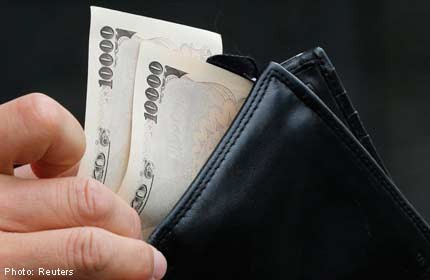Yen plunges after BoJ chief says he will quit early


TOKYO - The yen plunged to its lowest level in nearly three years against the dollar in Asian trade on Wednesday after the Bank of Japan's chief said he would quit early, fuelling more easing speculation.
The Japanese unit fell to 93.97 against the dollar in Tokyo afternoon trade, its lowest level since May 2010, and down from 93.61 in New York Tuesday. The euro also racked up gains at 127.60 yen from 127.13 yen in New York and 124.63 yen on Tuesday in Asia.
The yen's sharp tumble followed Bank of Japan (BoJ) Governor Masaaki Shirakawa's announcement late on Tuesday that he planned to quit on March 19, about three weeks before the end of his term.
His offer to resign intensifies the search for a successor who would take aggressive monetary policies promised by the new government led by Prime Minister Shinzo Abe, analysts said.
The BoJ and Abe's administration butted heads on policy matters, with the hawkish premier having openly said he wants a more like-minded candidate as Tokyo looks to boost the world's third-largest economy.
Last month, the bank said it would adopt a two percent inflation goal demanded by the new government in a bid to beat the deflation that has haunted Japan for years.
It also unveiled an unlimited asset-purchase scheme to start next year. But days later, Shirakawa cast doubt on the inflation target and said pressure on central banks has "risen globally more than ever".
London-based Capital Economics said in a note that Shirakawa's early departure may ease the leadership transition, but added that it "may not advance the process that much, depending on how accommodating the parliamentary opposition chooses to be".
Shirakawa said he would go early to coordinate with the ending of his two deputies' terms, rejecting speculation that government pressure forced his hand. "This explanation is entirely plausible although Shirakawa could perhaps be forgiven for wanting to leave as soon as possible given the criticism he has received for 'not doing enough' to end deflation," Capital Economics said. "However, no candidates have even been nominated for any of the three roles, let alone approved."
Yen "weakness has resumed with a vengeance", National Australia Bank said, while Citibank Japan chief currency strategist Osamu Takashima pegged the dollar to hit the 95.70 yen level in the next two weeks, a huge surge from the record-lows around 75 it fetched against the yen in late 2011.
The euro, meanwhile, dipped to $1.3578 from $1.3582 in US trade, following stronger-than-expected eurozone data that came ahead of a key European Central Bank policy meeting.
French President Francois Hollande on Tuesday called for the eurozone to manage its exchange rate, as fears mount that the euro's strength would hammer exporters and damage the currency club's recovery.
The dollar was mixed against other Asia-Pacific currencies, falling to Sg$1.2371 from Sg$1.2379 on Tuesday, to Tw$29.49 from Tw$29.52 and to 9,687 Indonesian rupiah from 9,698 rupiah.
The greenback also slipped to 53.01 Indian rupees from 53.35 rupees while it strengthened to 1,088.68 South Korean won from 1,086.63 won. It was nearly flat at 29.76 Thai baht and 40.64 Philippine pesos.
The Australian dollar slipped to $1.0356 from $1.0397, and China's yuan fetched 15.04 yen against 14.83 yen.